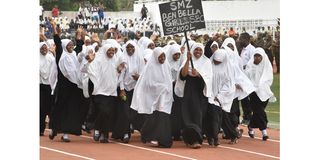What Sh116.7 billion ZIQUE project means for Zanzibar education

A group of students at a recent Zanzibar event. Many learners in the Isles will profit greatly from the latest World Bank financing. PHOTO | FILE
What you need to know:
- The International Development Association (IDA) fund of Sh116.7 billion is projected to improve teaching abilities and educational achievements while also contributing to closing the gender gap in basic school transition rates
Dar es Salaam. More than 400,000 primary school pupils in Zanzibar will have access to a comfortable learning environment, thanks to the new Zanzibar Improving Quality of Basic Education Project (ZIQUE) run by the World Bank
The $50 million (approximately Sh116.7 billion) International Development Association (IDA) credit, granted on December 22, 2022, is expected to enhance teaching abilities and educational outcomes while also assisting in bridging the gender gap in basic school transition rates. The ZIQUE project comes just one day after the World Bank once again issued an additional $775 million (approximately Sh1.8 trillion) aimed at funding the economic recovery and healthcare improvements in Tanzania.
Therefore, the ZIQUE initiative offers Zanzibar yet another opportunity to turn the tide in education. Zanzibar’s government removed school fees in pre-primary and primary schools in 2015 and secondary schools in 2018, resulting in a large rise in enrolment in public schools, which now serve over 467,000 pupils.
Significant hurdles, however, continue to impede all pupils’ advancement through the school system with acceptable learning levels. In this regard, ZIQUE has clearly arrived at the appropriate time and will assist in addressing the education sector’s primary difficulties through process and policy improvements in the education system that will serve to strengthen service delivery quality. Speaking to The Citizen in her office yesterday, Deputy Permanent Secretary of the Ministry of Education and Vocational Training, Dr Mwanakhamis Adam Ameir said the project was of great benefit to Zanzibar’s education. “This project does exist, and its benefits are substantial because it attempts to strengthen and elevate the entire education sector as a whole,” she said.
Dr Amier remarked that there has been an increase in the number of students in classes on the islands, so if the infrastructure is developed through the project, it will assist to lower the number of pupils in one classroom and make learning easier and better.
“If the number of pupils in one classroom reduces, the instruction will remain excellent. Teachers will become more relaxed, and pupils will readily absorb what they are being taught,” she believed.
For his part, Mr Nathan Belete, the World Bank Country Director for Tanzania, acknowledged that Zanzibar has made significant progress in ensuring universal access to basic education. “However, in order to accelerate growth and reduce poverty by 2050, considerable investments in core learning outcomes are required.”
He said critical innovations supported by ZIQUE such as the deployment of a school-based modality for the delivery of continuous professional development (CPD); the use of education technology to enhance teaching in the classroom and teacher CPD; and a large-scale learning assessment, will allow the government to systematically monitor and report on learning outcomes.
Tanya Savrimootoo, the bank’s Senior Education Economist, added that the project will assist the island in developing strategies to address learning gaps and problems.
According to them, ZIQUE beneficiaries included pupils with impairments, particularly those who are visually impaired, through the production of customised learning materials. Others will benefit from the inclusive design of new classrooms and schools as well.
“ZIQUE will also help over 13,000 government primary and secondary school teachers (69 percent of them are female) and over 520 school principals in the public school system. Ministry personnel in important departments and responsibilities who are critical to the successful implementation of each component would be among the other direct beneficiaries,” said Mr Belete.
He revealed that consultations with numerous development partners, including the Swedish International Development Cooperation Agency, the United States Agency for International Development, and the Kwarara Media Education Centre, influenced the project’s design (which is supported by the Korea International Cooperation Agency).




